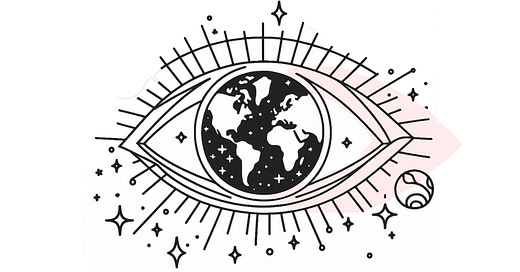Hello and welcome to rewilding philosophy, your newsletter about ekophilosophical health for our times.
Worldviews are like the glasses we never take off. They shape how we see everything—our reality, our decisions, our morning coffee. Worldviews are more than just opinions; they're the architects shaping our societies. The current dominant social worldview feels like trying to catch the ocean in a teacup. It’s reductionist, leaving out the dazzling mess of coexistence and relationality.
At the same time, the concept of worldviews is insufficient. It’s not enough to change our worldview intellectually, it also has to be embodied and practiced and lived on a daily basis. That’s what I think practical philosophy can offer - practical philosophy is about finding a philosophy and living that philosophy. It’s a practice of becoming, of identity formation, of consciously choosing principles, ideas and narratives to live by and to try to live according.
To me, this is the most exiting practice in the world.
Most times, the philosophies we live by are hand-me-downs from our upbringing and and our environment - our human environment as well as our nonhuman environment (mountains, the weather, oceans etc.). Society tells us what’s hip and happening—like chasing money or measuring our self worth based on that money. Often, we accept these philosophies without questioning.
Many of us sense though that the principles we live by, many of the values and aspirations we hold, don’t cut it anymore. In times of the Anthropocene the dominant philosophies seem insufficient - to say the least.
And so we search for alternatives. Sometimes, we are not even aware that we are doing this. Yet, we look to indigenous wisdom, self-helpers, spirituality, techno optimism… They all offer something helpful. None of them offer something complete. That’s in the nature of a philosophy - I don’t think any philosophy can be free of blind spots or shadows. Searching for better philosophies and living by them (practical philosophy) is how we change as humans. I am inclined to say how we evolve as humans, but that would be presumptuous: I am not sure we are actually evolving or rather - as hinduists believe - that the universe moves through cycles of creation, sustenance, and dissolution. But that’s part of another discussion.
What’s clear is that our current materialistic, reductionist, capitalist philosophy is as useful for our times as a snow jacket in the Sahara.
Finding and living different philosophies requires time, self examination and deliberate practice as well as discomfort. It also takes the willingness to admit that we are wrong.
“The philosopher needed to be trained not only to know how to speak and debate, but also to know how to live. The exercise of philosophy was therefore not only intellectual, but could also be spiritual. Hence, the teaching and training of philosophy were intended not simply to develop the intelligence of the disciple, but to transform all aspects of his being - intellect, imagination, sensibility, and will. Its goal was nothing less than an art of living, and so spiritual exercises were exercises in learning to live the philosophical life. Spiritual exercises were exercises because they were practical, required effort and training, and were lived; they were spiritual because they involved the entire spirit, one's whole way of being. The art of living demanded by philosophy was a lived exercise exhibited in every/ spect of one's existence.” Pierre Hadot
Most of us find ourselves in situations where it seems impossible to practice philosophy.
Plus, everyone’s picking different philosophies like it’s a potluck dinner, leading to differences among us. And these differences often are what divides us. Embracing practical philosophy therefore also means to embrace difference. As Gregory Bateson said “it’s the difference that makes a difference”.
We don’t have to find a new unifying philosophy - like Christianity or capitalism used to be. Ecosystems actually thrive and depend on diversity. And if we take the concept of natureculture, as proposed by Donna Haraway and others, seriously, (nature)culture will also thrive with a high diversity of philosophies. The question is therefore how these different philosophies can work together. For Hadot, to philosophize is to learn how to dialogue - with oneself and others.
Embracing a practical philosophy isn't about finding the magic bullet that will solve the world's problems or suddenly make you a morning person. Instead, it's about crafting a life that makes sense and feels meaningful, both to you and in the greater view of human existence. Practicing philosophy means to jump into the messiness of being human with both feet and realizing that while there are better and worse ways to live, maybe, just maybe, the point isn't to have a perfect life, but to enjoy the process of getting there.



